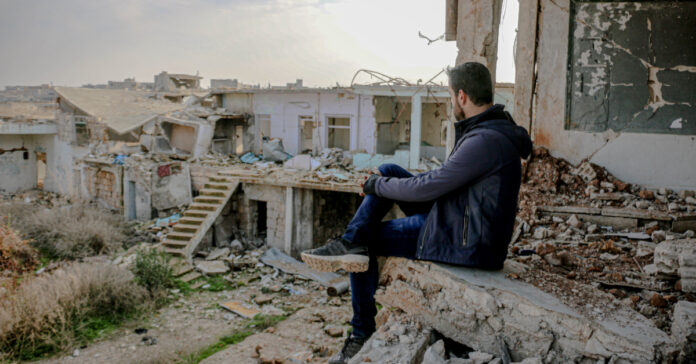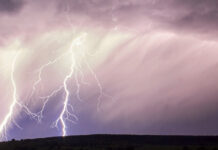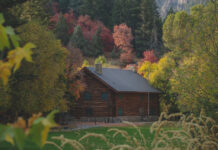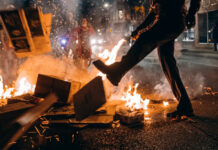
If we end up in a nuclear war, suffer a debilitating EMP strike, for face a similar country-wide calamity, then we have to survive three things:
- The immediate impact of the event
- The first month following the disaster
- The following year
Let’s look at these one at a time, and I will explain.
The Immediate Event
If we end up in a shooting war in which nuclear missiles and bombs are flying back and forth, then the most immediate challenge is living through the explosions. The best way to do this is to be far from where a nuclear explosion occurs. The second best is to be in a blast shelter, something to which few of us have access.
In the event of an EMP or CME, we have to survive the immediate cessation of electrical power, followed by the rapid loss of other utilities and modern conveniences (read more here). If you’re sitting in your easy chair, as I was a few days ago when the power went out, that’s pretty easy. If you are in an airplane, it is going to be almost impossible. Immediate survival could also be a challenge if you are if on a subway, in a car in traffic, on the 48th floor of a building, out to sea in a powerboat, or on an amusement park ride, all of which could leave you stranded far from your survival gear.
In any of these events, being at work or otherwise away from home is something you will have to overcome. If you are far from home, the danger is greater and the likelihood of survival is lower.
The First Month
After a calamity, I expect days 4 through 28 will be among the most dangerous because of how people will react to the sudden lack of utilities and food. While there may be some cooperation immediately following an attack, the goodwill towards your fellow human may fade away when you stand between them and their next meal.
In a nuclear event, it will be critical to avoid exposure to fallout for at least the first few weeks. This is best achieved by placing large amounts of dirt, stone, concrete or other dense materials between you and the outside world. Of course, you still have to have food, water and a way to dispose of wastes. That takes planning.
When the radiation fades, or in any other disaster, other people may be the greatest threat. Once the food on the store shelves is gone or spoiled, people will panic and may become violent. When those with evil intent realize the police are not coming, they will act like it is the Purge. The strong will dominate the weak and anyone who has ever wanted to commit a crime will find they are free to do so. It will be an ugly time, especially in areas with a high population density.
The first month is also when people will die from a lack of clean water and the spread of diseases caused by a poor hygiene and improper disposal of human waste. Over time, people will become weak from starvation, which will make them easy victims, or kill them. The first to go will be the elderly and infirm. Others will run out of the medications that keep them alive. Depending on the weather, people will also die from exposure.
The best advice I can give for surviving this turbulent time is to get out of Dodge. Leave the city. Bug out. Head to your retreat. Once you are there—assuming both it and you survived the original event—you will have to depend on your preps to ensure you don’t fall prey to one of the above dangers, be it disease, violent humans, or exposure.
The Next Year
Over time, things will calm down. It may take a few months, but the will be fewer people alive, and cities that once had a high population density will have far more dead bodies than living ones. That will mean less competition for a limited amount of resources. It may also mean groups have formed, and they have established territories. Instead of one-on-one violence, we may see more organized violence as gangs or groups battle each other for territory and resources. Your best bet is avoidance. This is best achieved by distance and being well off the beaten track.
With no chain of command, there may be rogue units of police or military personnel forced to survive on their own, which may mean at the expense of others. It is also possible that there will be refugee camps or the government will “recruit” people into work programs to help rebuild the country. In this case, the police or military will be the guards and overseers. This is something you will want to avoid unless it is your only chance to get medical treatment or food.
For many preppers, the first year will also be one of experimentation and failure. People who cannot adapt to the new world will continue to die, just at a slower pace. Some will find that living off the land or starting a garden from scratch is not as easy as they had planned. Even those in well-prepared survival groups will find the new dynamic a challenge and will suffer setbacks. Having more food and other resources than you need is your best bet. Over prepare, you may need it.
Year Two and Beyond
Ideally, those who are well prepared will have the food stores and other resources to live through this first year. They will have an additional cushion that will allow them to have bad harvests or lose people in attacks. With any luck, they will have the fortitude to see it through and to survive not only the first year, but the inevitable failed harvests and unexpected setbacks to come.
If 90 percent of the population does die off in the first year, there will be opportunities for gleaning. There will be warehouses with things the looters did not want in the immediate aftermath that have value a year later, whether that is dish detergent or underwear. The challenge will be reaching them and returning safely, as well as possibly negotiating or trading with other survivors who consider the warehouse theirs. There will be things in empty houses, such as a cast iron Dutch oven or a half-empty bottle of bleach, that can aid the survivors.
As time goes on, those who survived the first year should become more self-sufficient and depend less on stored food, which will eventually run out. When the world calms down and most of the gangs have killed each other off or are busy defending their territory, there may be some re-establishment of trade on a small scale that then grows.
Rebuilding also may take place, either driven by the remnants of the government or by free men and women who have good ideas and the skills to implement them.
One Step at a Time
As you can see above, an important first step is to have a retreat, whether it is your own place in the country or the home of a friend or relative in a small town. As someone living at their retreat, trust me when I tell you we need people to come and reinforce us. Ten people have an invitation and we need at least six of them to make it here. If you find like-minded people who will allow you to use their retreat, do not fear you are imposing on them; they will need the manpower in an era when there are no power tools or gasoline. Just help with the preps to the extent you can, so the burden to provide food is not entirely on your hosts.
Once you get your retreat taken care of—along with the route mapping, the bug out bags, and other components of a successful bug out—you should start to prep to survive the first month at the retreat. This requires what we call the Big Three (food, water and shelter), which you should have at the retreat. You should also address self-defense, which will be important during and after this period.
When your preps are such that you can survive 30 days after a global calamity, focus on the next year and on becoming more self-sufficient. Yes, you need storage food, but you will also need to produce and preserve your own food after the disaster. Seeds are a good start, but having a garden with fencing and rich soil is even better. Spend time at the retreat and improve it. Lay the groundwork for long-term survival.
Re-evaluate
Hopefully, reading this has inspired you to look at your preps and your plans. Preparing for a hurricane, a blizzard or other short-term disaster, which is how many preppers start, is all well and good, but it won’t help you survive TEOTWAWKI. Prepping for localized incidents gets you in the right state of mind, but it does not go far enough. Look at the world, the threat of war or financial collapse, and make the leap. Be prepared not just to survive a few weeks, but work towards being prepared for a few years. It’s not easy or cheap, but it can be done, especially over time.







